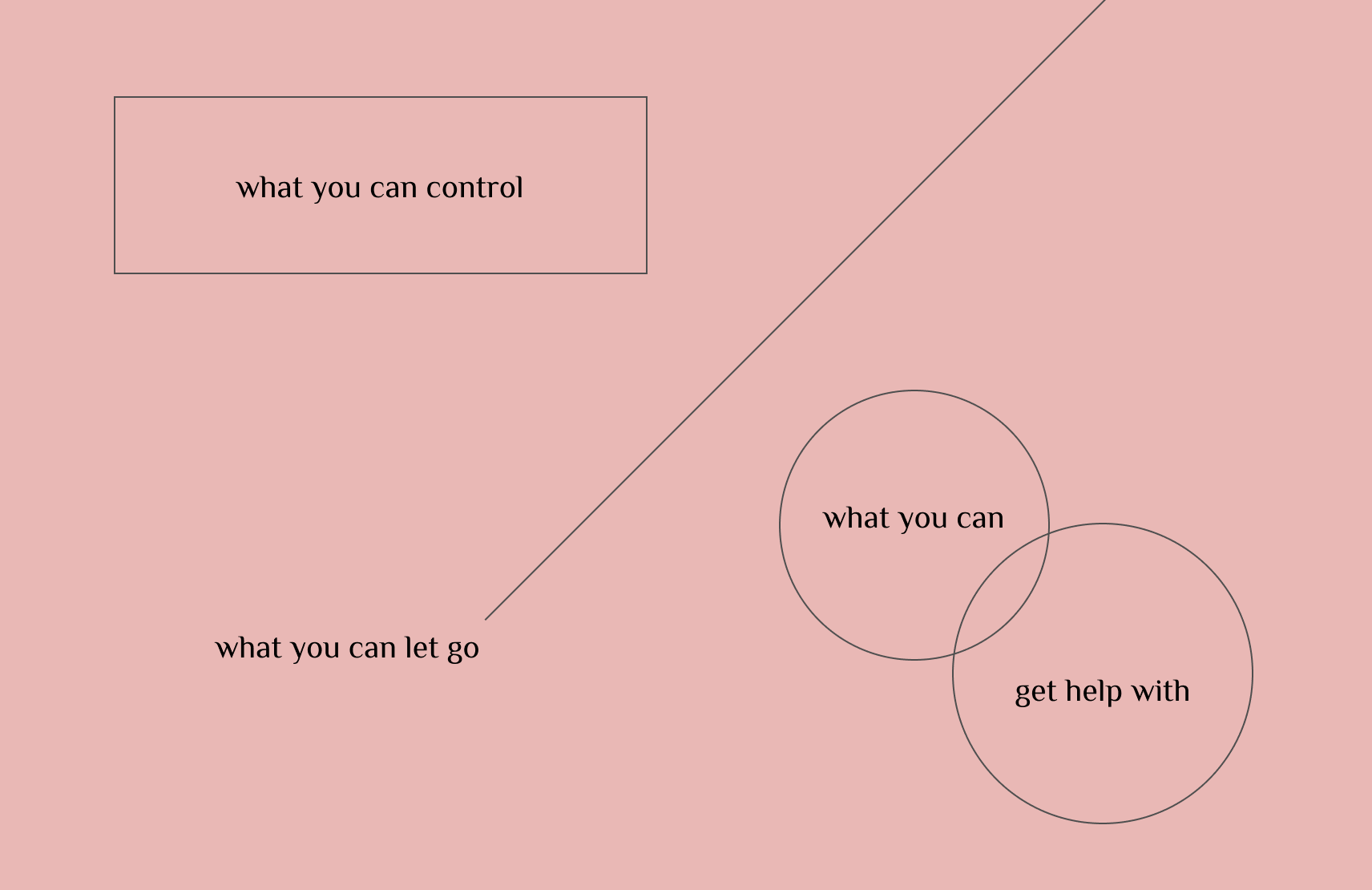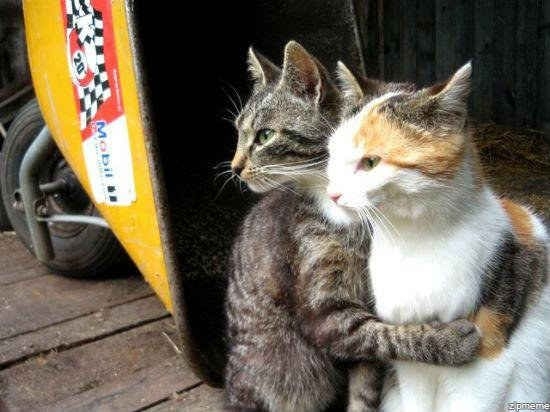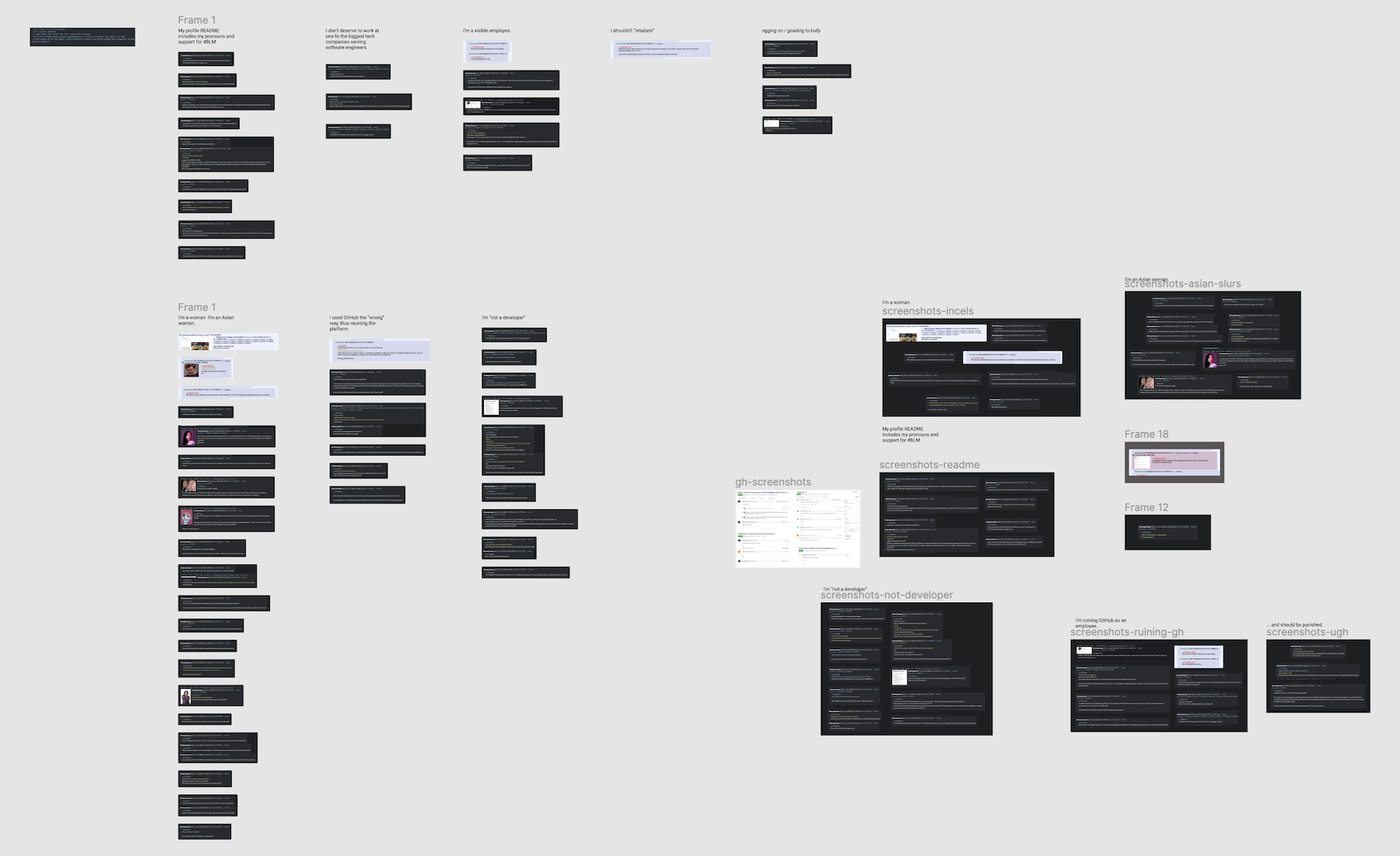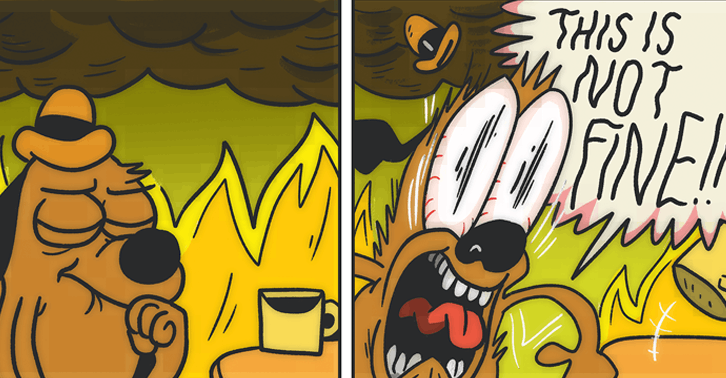
Guide for handling online harassment
When I was getting harassed online over the span of a few months, I received many comments about my strength and resiliency throughout the online abuse campaign. I want to demystify this, because my friends, partner, colleagues, and therapist worked as a collective to remain diligent and supportive of me. Abuse and trauma cannot fall squarely on the victims' shoulders.
I wrote this guide so we can continue taking care of ourselves and our community when isolating events like this happen. Feel free to take what works for you, and leave what doesn't—please do what feels most comfortable!
Alright, let's move onto the guide. There are three guiding themes that I follow:
- What you can control
- What you can get help with
- What you can let go

1. What you can control
First things first—center yourself and your needs by focusing on what's in your control.
Your energy and attention 🌟
PROTECTING YOUR ENERGY, diverting your attention, and prioritizing your mental health are the most important things you have control over. It can be difficult to make decisions when your mind and body is responding to high stress and trauma, so forgive yourself for taking time off and stepping away.
Reiterate to yourself that the abuse is not your fault, you are the victim, and you do not deserve any of it.
Protect your energy. Not everyone and everything deserves a response. Choose your battles. pic.twitter.com/oSak70yRNR
— sailor moon (@sailorcmoon) August 18, 2020
I think about this GIF all the time as a reminder. 😊
Safeguarding against doxxing
My lovely friend Kat Lo reached out and made sure I had resources to protect my online privacy and safety. She recommended getting DeleteMe to remove personal information from data brokers on search engines.
She also set me up with TallPoppy, a company that specifically helps employees targeted by online abuse. I went through personal safety checklists and cannot sing enough praises for this product 💜 Be sure to also:
- Remove your location from your Twitter bio, LinkedIn, and any other accounts
- Put all your social media on private (especially Instagram, where you may give away visual location cues)
- Remove your email everywhere you can
- Including resume PDFs
My other favorite resources
- 🙅🏻♀️ Block Party: founded by Tracy Chou, Block Party is an app that protects your online time and attention. Any unwanted messages are sent to a "Lockout Folder," which you can review later. You can also let friends review the activity and help take any action. Block Party has given me peace of mind that any Twitter escalations will be manageable.
- 📚 A Smart Girl's Guide to Privacy: this was my first introduction to protecting myself on the internet, way back when I started working on trust and safety work. I'm thankful for the EM on my team at the time for giving me a solid foundation!
- ✅ securitycheckli.st by Brian Lovin has comprehensive checklists, options, and resources to learn more. Open source, too!
Moving forward
Lastly, you're in control of picking your battles and deciding what you want to do after the storm. (Sometimes there is no "afterwards," but rather lulls in between attacks.) You get to decide where to direct the energy you've protected after resting.
For me, I channeled my energy into writing a thoroughly-documented blog post. I also wrote an internal letter to our leadership team proposing more inclusive healthcare options and investment in safety-focused engineering.
You're allowed to express anger. You're allowed to take up space. You're allowed to lay low for a while. There is no right answer—do what feels comfortable for you. Don't feel pressured to have all the answers. And you can always circle back on different ways to take action at any point in time. 🖤
2. What you can get help with
Time to get your support squad together! ⚔️ Having even one person to assist you with the following can absorb some of the stress you're experiencing. And those around you WANT to help—you are not a burden. 💕
Get content warnings for abusive content
❗️ I cannot stress this one enough, y'all. Before diving in too deep, ask your support squad to scan comments, threads, emails, etc in order to give you content warnings.

A helpful content warning could be, "Half of these comments are rape and death threats" or "Most of these replies are mansplaining trolls, but there are a few offensive images." Only proceed with viewing harassing content if you feel comfortable. You are not weak for prioritizing your health!
Monitor and moderate your online content
In order to respond quickly to online abuse, work with your group to pinpoint the source of harassment. Save Google searches or Google Alerts to notify when your name + any circulating content appears on Twitter, Reddit, 4chan, Hacker News, etc. Monitor keywords accordingly for doxxing and upticks in activity.
Depending on the social media network or platform, have others help you moderate content with available tools (e.g., reporting comments and users, deleting content, etc).
Make sure your group coordinates with you when your personal identifying information is leaked. Since my social media accounts and email were circulating, I followed the steps in the safeguarding against doxxing section.
I didn't experience my phone number or address getting leaked. But if this were to happen, I would ask my squad to screenshot exactly where the doxxing is happening and report to the platforms immediately. I'd rely even more on my network so I could disconnect completely, contact law enforcement (with zero expectations), and move to a safer location. Here are relevant articles from Crash Override Network and Criminal Defense Lawyer.
Collecting receipts
It's super important to document everything as it happens, but can be emotionally exhausting as the victim. Mobilize with your support squad so receipt-collecting can be split up. Make sure these screenshots are backed up. You can also get creative with cataloguing them—my friend Kathy helped take screenshots across three 4chan threads and used Figma to organize them:

I also have a just-in-case Airtable with all of my harassers from GitHub, anonymous emails, Twitter DMs, etc. A group of women and WoC GitHubbers helped fill this 50-cell spreadsheet, readying me if I ever have the desire to do anything. 🙊
Sending palate cleansers
Sometimes, you just need to be reminded that good does exist on the internet. Ask friends for their favorite TikToks or cat videos. Set up recurring video chats with friends to drink tea and make you laugh (like I did countless times with Maggie and Vivian 💝).
And for anyone reading this that may end up supporting someone going through online harassment: SEND AFFIRMATIONS! It's a helpful reminder of their worth amidst the trash. 🌸
Get yourself a friend like @tsunamino who will affirm you so much that you start crying 😭😂✨
— kat fukui (@katfukui) July 16, 2020
3. What you can let go
The words and content
I know this is hard. Sometimes, particular comments and messages cross my mind when I'm anxious. And from my experience, simply ignoring the content isn't helpful because of its deeply personal nature and place of happening (e.g., the platform you work on).

It is instead more useful to let go, rather than ignore. You acknowledge the content—that THIS IS NOT FINE. 🔥 It is abusive, incorrect, insecure, and ultimately not worth your precious time.
You're not ignoring the fact that the abusive content exists to target and silence you. Sometimes you'll need a cry, time off, or a venting session with friends. And that's okay, because you're performing the radical and magical act of protecting your energy and attention. ✨
Responding or seeking vengeance
(I want to make it clear that this is something you have the choice to let go. Ultimately, you choose where to direct your energy—and perhaps this an area where you can ask others for help on.)
I let the idea of responding to harassing messages/seeking vengeance go after acknowledging that moving on does not equal "losing" to the haters. Rather, sharing more of my world is the best middle finger to the haters I could possibly give. I'd rather spend my time putting out more positivity than trying to track down everyone's employers.
As a middle ground, I always update the harasser Airtable I mentioned before, just in case I ever want to act on anything in the future. This is a low-energy-yet-spicy alternative to responding to every 7 paragraph email. 🌶️

☝️ I'm calm by default, but prepared if I must~
Anxiety of future attacks
One of the more sinister aspects of handling online harassment is the anxiety around wondering when/what the next attack will be. Since my first incident over 3 months ago, I've consistently received troll comments or anonymous emails every week since then (at least it's a predictable schedule! 🙃). In the beginning, it was impossible to focus on work or joyful activities because of the lurking fear for my mental health... even in the quiet moments.
But the only thing that has consistently helped me let go of uncertainty anxiety is iterating on and following this guide as an incident playbook. It's now a structured routine where I don't have to emotionally burden myself anymore. It's still frustrating and NOT FINE, but I now have this blueprint to protect and allow me to live my most fulfilling life. 💖

I hope sharing this guide helps anyone who may need it! Remember what you can control, what you can get help with, and what you can let go. Fuck the haters and live on magically 🌟